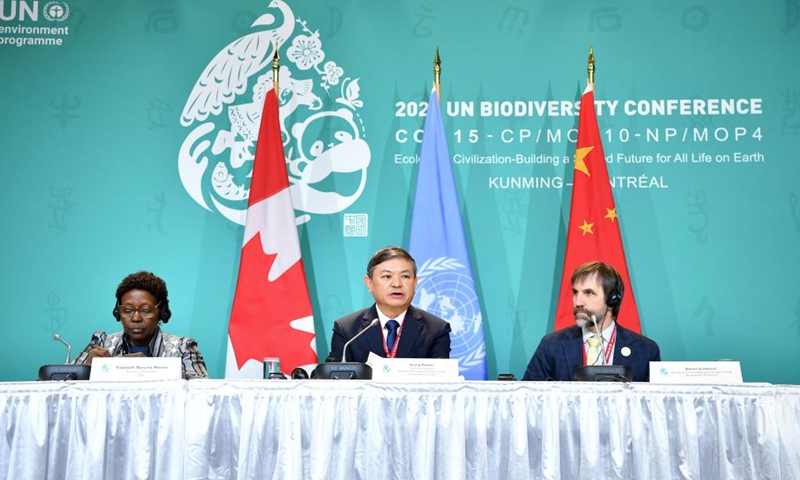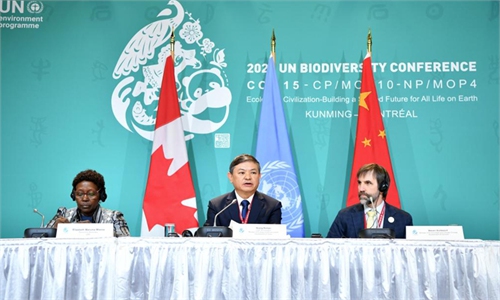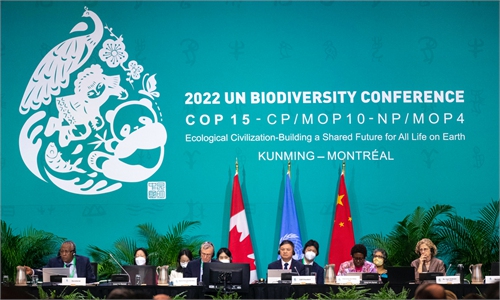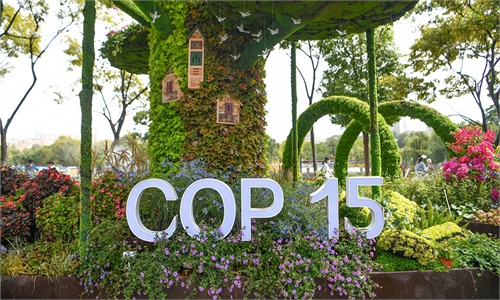COP15 deal proves sticking to multilateralism works well: Global Times editorial

Huang Runqiu (C), COP15 president and China's minister of ecology and environment, speaks during a press conference in Montreal, Canada, on Dec. 17, 2022. (Xinhua/Ren Pengfei)
The Second Part of the 15th Meeting of the Conference of the Parties to the Convention on Biological Diversity (COP15) has made historical achievements. On Monday local time, Huang Runqiu, COP15 president and China's minister of ecology and environment, announced that the Kunming-Montreal Global Biodiversity Framework was adopted. After four years of tough negotiations and more than 10 days of heated discussions, at the last minute of saving biological diversity, the over 190 countries eventually reached a consensus. The landmark framework whose significance can be compared to that of the Paris climate pact comes into being.The Montreal summit is considered the last chance to save the biological diversity that is on the brink of extinction. The international community has a deep understanding and a strong sense of urgency about this. The most important sign of the success of COP15 is whether the "framework" can be achieved. The framework proposes the "30x30" goal, which is the goal of protecting 30 percent of the Earth's land, coastal areas and inland waters by 2030, which is also the minimum area of natural areas required for basic human survival and development. To date, 17 percent of the world's land and 8 percent of the waters have been protected. Some analysts believe that the setting of this goal reflects the ambitions of various countries in global biodiversity governance, noting it's also pragmatic and operable. UN Secretary-General António Guterres said the agreement shows that "We are finally starting to form a peace pact, with nature."
The adoption of the framework is exciting, but the process has been full of twists and turns. The biggest challenge is how to provide sufficient financial, technical and capacity support for biodiversity conservation, and establish an implementation mechanism and a national action plan. The developed world insists on the "30x30" target, while the developing world accuses developed countries of setting too high targets without providing enough money to help meet them. Due to disagreement, some public opinion called COP15 the "ugly duckling" of global policy. During this meeting, more than 60 representatives from developing countries even left the meeting. Whether they can bridge differences and reach consensus will test the coordination ability of all parties. It is even more of a tough test for the presidency.
As presidency of COP15, China has successfully led this super-large-scale international negotiation. Chinese President Xi Jinping delivered two important speeches stressing to build a community for all life on Earth, which provided an important political impetus for the final positive results of the conference.
In the toughest negotiation phase, China had proposed a package that favors developing countries in terms of funding and developed countries in terms of protection levels, which is believed to have provided the much-needed impetus to the sometimes contentious negotiations.
Even Steven Guilbeault, Canada's environment minister, admitted that disagreements on this scale were commonplace at such summits which he had been attending for 25 years. "I've never seen a presidency text tabled and have so much support for it from the get-go," with the vast majority of countries signing up right away, he enthused.
The efforts from the Canadian side should also be commended. Some diplomatic disputes between China and Canada did not affect the cooperation between the two sides at COP15. Canada has also made great efforts to achieve the framework. Such practical cooperation that transcends geopolitical differences is rare today.
Whether it is China, Canada, or other participants in COP15, they all meet each other halfway from the common interests and long-term interests of all mankind. The international community ultimately needs consensus to push forward solution to global issues. We should firmly grasp the priorities of human society and the greatest common denominator, prioritize the principle of right and wrong over intimate relations, get rid of narrow interest calculations as much as possible and reduce political interference on cooperation.
At a time when anti-globalization and geopolitical turmoil have blurred the vision of a "global village," the significance of a framework that is related to the well-being of all mankind and embodies the spirit of multilateralism is far beyond the protection of biodiversity itself. It has inspired the international community to embrace multilateralism and proves that multilateralism can help to achieve great success.
We also noticed that the US has also expressed its gratitude for the diplomatic efforts made by China and Canada, and stressed that it hopes to have more in-depth cooperation with China in relevant areas. This scene is rare in the current international relations. Concerning global biodiversity governance, China has changed its role from a follower to an active participant, and finally to a leader and promoter. These changes have benefited the world. China's economic development is a dividend to the whole world, and the improvement of China's international influence has also proved to be a dividend to the world.
In this sense, the historic agreement reached at COP15 transcends the differences between East and West and the gap between North and South. Its significance goes far beyond the field of biodiversity conservation. It shows us the possibility and hope of mankind taking joint actions to deal with global challenges.



